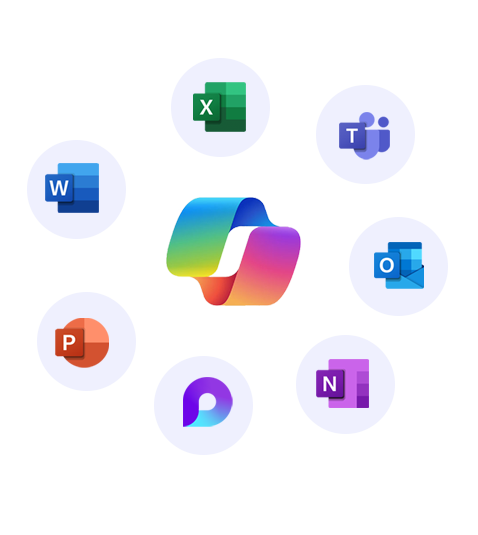Microsoft 365 Copilot AI for Personal Injury Lawyers
A recent survey by the American Bar Association found that a staggering 52% of lawyers experience burnout. Burnout can result from constant stress, making it harder to dedicate yourself to your clients.
Lawyers who specialize in personal injury face a demanding profession that demands case management and close client contact. Law firms are being offered AI tools to improve their workflows with the advent of generative AI assistants like Microsoft 365 Copilot.
In this article, we examine the role of AI tools in personal injury law and examine the specific benefits and applications of Copilot prompts for lawyers.
Understanding Generative AI Assistants for Personal Injury Lawyers
Personal injury law demands strategic planning, efficient management, and innovative tools to dominate the field. Copilot AI serves as a virtual assistant helping lawyers automate their tasks, manage workflows, and deliver exceptional client experiences.
Key Features of AI Tools for Personal Injury Lawyers
Personal injury law is a complex field where the success of each case heavily relies on the careful assembly and analysis of evidence. Personal injury lawyers are using Microsoft Copilot to conduct research, deal with liability and negligence claims, make data-based decisions, and reconstruct accident scenes.
Microsoft 365 Copilot stands out by providing an integrated solution that works across various applications like Word, Excel, and Outlook. Personal injury lawyers can use Copilot in Microsoft Teams to collaborate on cases, share insights, and maintain communication with all stakeholders. Let’s dive into key features of AI tools for Personal Injury Lawyers.
Advanced Research Capabilities with Microsoft Copilot
Research is the basis of any personal injury case. Microsoft Copilot allows personal injury lawyers to access a wide range of legal information from multiple sources including case laws, statutes, regulations, and existing documents.
For example, a lawyer handling a slip-and-fall case can use Copilot to quickly locate similar cases and relevant local safety regulations to support their client’s claims. Artificial intelligence can also filter and retrieve relevant data, which can speed up and improve lawyers’ decision-making.
Liability and Negligence
Technology such as autonomous vehicles and smart devices introduces new complexity to personal injury cases blurring the lines between manufacturer and operator responsibilities.
For instance, in a crash involving an autonomous vehicle, Copilot can help lawyers understand whether the manufacturer or the vehicle operator is at fault by providing insights into similar past cases and the latest industry standards. Personal injury lawyers must now understand the underlying technologies to argue negligence and liability effectively.
Data-Backed Decision-Making with Copilot AI
For a law firm to succeed, informed decisions must be made quickly. A key component of Copilot AI is its data analytics which helps monitor key performance indicators and discover critical evidence, such as photos and videos.
For example, in workplace injuries, Copilot can analyze data from past incidents to identify patterns that support a claim of negligence. This access to real-time data simplifies complex decision-making processes, allowing lawyers to strategize effectively based on solid data insights.
Accident Reconstruction and Analysis
While Copilot AI does not analyze accident scenes directly it significantly helps in the process by acting as a digital detective. It assists in gathering and organizing accident-related data, streamlining communications with field experts, and facilitating the research of legal precedents related to similar accidents. This organized approach ensures a robust foundation for arguing cases and increases the likelihood of favorable outcomes.
For example, Copilot could organize and present data to illustrate how a series of similar traffic accidents have been dealt with, supporting a client’s claims with comparative negligence analysis.
Real-World Examples of AI in Action
- Case Analysis: Imagine a lawyer receiving a new claim. The lawyer uses Copilot to instantly generate a report that compares the claim against similar historical cases. Then it analyzes the strengths and weaknesses and provides an estimated settlement range based on predictive analytics.
- Client Correspondence: A lawyer can instruct Copilot to draft personalized follow-up emails to clients waiting on settlement offers. As a result, they are kept in the loop without the lawyer spending time on routine communications.
- Preparation for Proceedings: Before a mediation or trial, a lawyer can ask Copilot to prepare the necessary documents, case briefs, and a list of key points to argue, all tailored to the specifics of the case at hand.
Conclusion
The integration of generative AI into the legal industry, especially in the field of personal injury law, is a revolutionary development as AI continues to evolve. Personal injury lawyers equipped with AI tools such as Microsoft 365 Copilot are better prepared to meet the challenges of their practice. It also offers improved services to its clients while optimizing their workflows. The future of personal injury law practice is here and it is entirely digital, data-driven, and AI-powered.
Apps4Rent – Tier 1 Office 365 Cloud Solution Provider
Copilot integrates with all your favorite Microsoft apps

Get started with
Microsoft Copilot today!